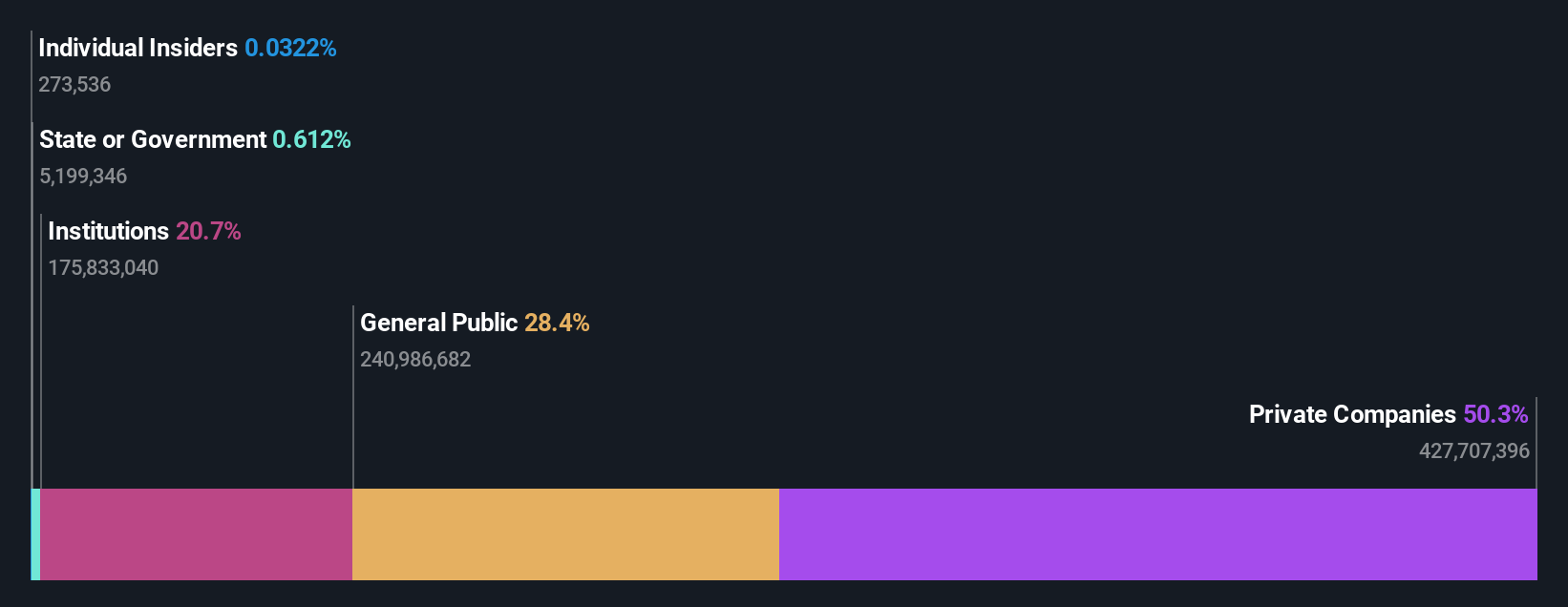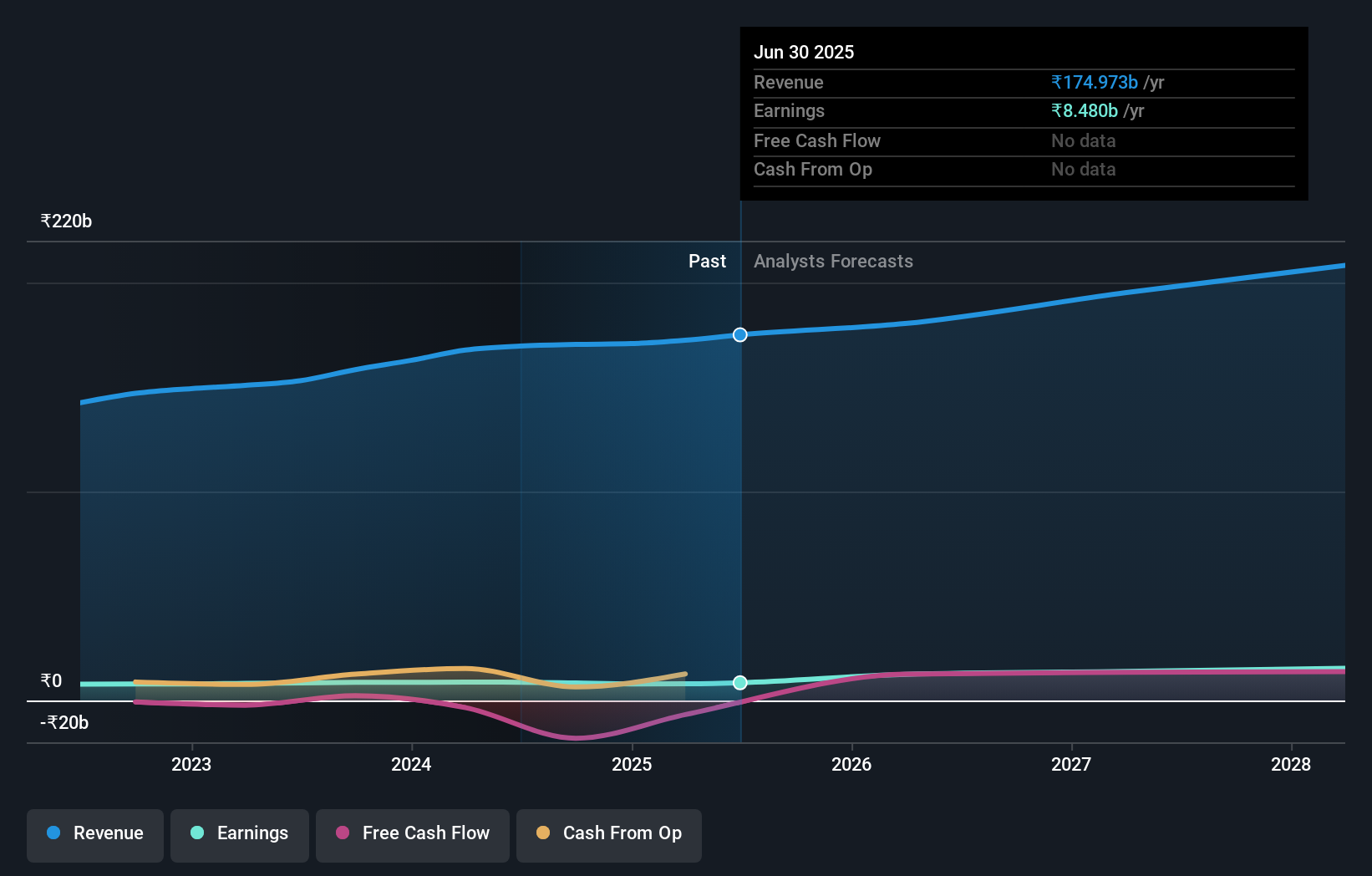- India
- /
- Auto Components
- /
- NSEI:EXIDEIND
Private companies account for 50% of Exide Industries Limited's (NSE:EXIDEIND) ownership, while individual investors account for 28%
Key Insights
- Exide Industries' significant private companies ownership suggests that the key decisions are influenced by shareholders from the larger public
- 50% of the business is held by the top 2 shareholders
- 21% of Exide Industries is held by Institutions
A look at the shareholders of Exide Industries Limited (NSE:EXIDEIND) can tell us which group is most powerful. We can see that private companies own the lion's share in the company with 50% ownership. That is, the group stands to benefit the most if the stock rises (or lose the most if there is a downturn).
And individual investors on the other hand have a 28% ownership in the company.
Let's delve deeper into each type of owner of Exide Industries, beginning with the chart below.
See our latest analysis for Exide Industries

What Does The Institutional Ownership Tell Us About Exide Industries?
Institutions typically measure themselves against a benchmark when reporting to their own investors, so they often become more enthusiastic about a stock once it's included in a major index. We would expect most companies to have some institutions on the register, especially if they are growing.
As you can see, institutional investors have a fair amount of stake in Exide Industries. This suggests some credibility amongst professional investors. But we can't rely on that fact alone since institutions make bad investments sometimes, just like everyone does. When multiple institutions own a stock, there's always a risk that they are in a 'crowded trade'. When such a trade goes wrong, multiple parties may compete to sell stock fast. This risk is higher in a company without a history of growth. You can see Exide Industries' historic earnings and revenue below, but keep in mind there's always more to the story.

Hedge funds don't have many shares in Exide Industries. Looking at our data, we can see that the largest shareholder is Chloride Eastern Industries Pte Ltd. with 46% of shares outstanding. In comparison, the second and third largest shareholders hold about 4.3% and 3.0% of the stock.
A more detailed study of the shareholder registry showed us that 2 of the top shareholders have a considerable amount of ownership in the company, via their 50% stake.
Researching institutional ownership is a good way to gauge and filter a stock's expected performance. The same can be achieved by studying analyst sentiments. Quite a few analysts cover the stock, so you could look into forecast growth quite easily.
Insider Ownership Of Exide Industries
The definition of company insiders can be subjective and does vary between jurisdictions. Our data reflects individual insiders, capturing board members at the very least. The company management answer to the board and the latter should represent the interests of shareholders. Notably, sometimes top-level managers are on the board themselves.
Most consider insider ownership a positive because it can indicate the board is well aligned with other shareholders. However, on some occasions too much power is concentrated within this group.
Our information suggests that Exide Industries Limited insiders own under 1% of the company. We do note, however, it is possible insiders have an indirect interest through a private company or other corporate structure. It is a pretty big company, so it would be possible for board members to own a meaningful interest in the company, without owning much of a proportional interest. In this case, they own around ₹108m worth of shares (at current prices). Arguably, recent buying and selling is just as important to consider. You can click here to see if insiders have been buying or selling.
General Public Ownership
The general public, who are usually individual investors, hold a 28% stake in Exide Industries. While this group can't necessarily call the shots, it can certainly have a real influence on how the company is run.
Private Company Ownership
It seems that Private Companies own 50%, of the Exide Industries stock. It might be worth looking deeper into this. If related parties, such as insiders, have an interest in one of these private companies, that should be disclosed in the annual report. Private companies may also have a strategic interest in the company.
Next Steps:
I find it very interesting to look at who exactly owns a company. But to truly gain insight, we need to consider other information, too. Take risks for example - Exide Industries has 1 warning sign we think you should be aware of.
But ultimately it is the future, not the past, that will determine how well the owners of this business will do. Therefore we think it advisable to take a look at this free report showing whether analysts are predicting a brighter future.
NB: Figures in this article are calculated using data from the last twelve months, which refer to the 12-month period ending on the last date of the month the financial statement is dated. This may not be consistent with full year annual report figures.
Valuation is complex, but we're here to simplify it.
Discover if Exide Industries might be undervalued or overvalued with our detailed analysis, featuring fair value estimates, potential risks, dividends, insider trades, and its financial condition.
Access Free AnalysisHave feedback on this article? Concerned about the content? Get in touch with us directly. Alternatively, email editorial-team (at) simplywallst.com.
This article by Simply Wall St is general in nature. We provide commentary based on historical data and analyst forecasts only using an unbiased methodology and our articles are not intended to be financial advice. It does not constitute a recommendation to buy or sell any stock, and does not take account of your objectives, or your financial situation. We aim to bring you long-term focused analysis driven by fundamental data. Note that our analysis may not factor in the latest price-sensitive company announcements or qualitative material. Simply Wall St has no position in any stocks mentioned.
About NSEI:EXIDEIND
Exide Industries
Designs, manufactures, markets, and sells lead acid storage batteries in India and internationally.
Excellent balance sheet with limited growth.
Market Insights
Community Narratives




